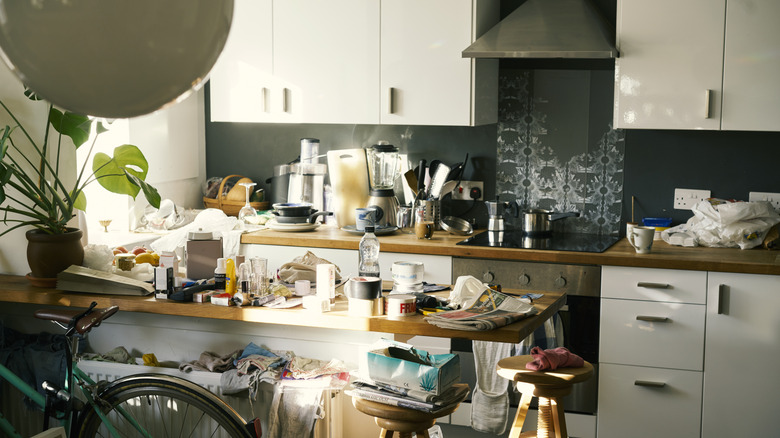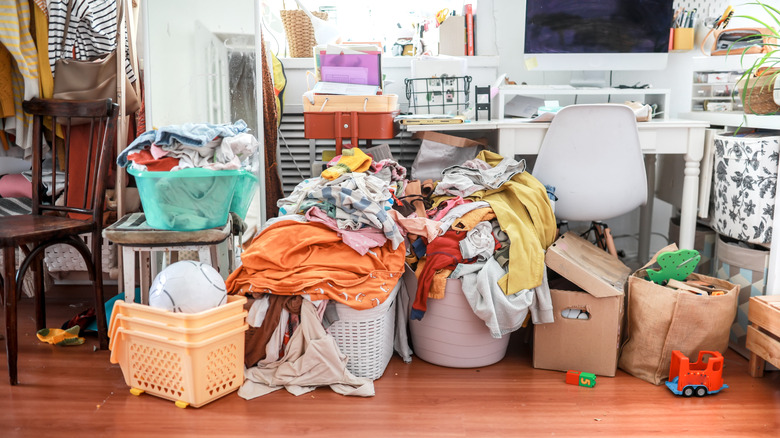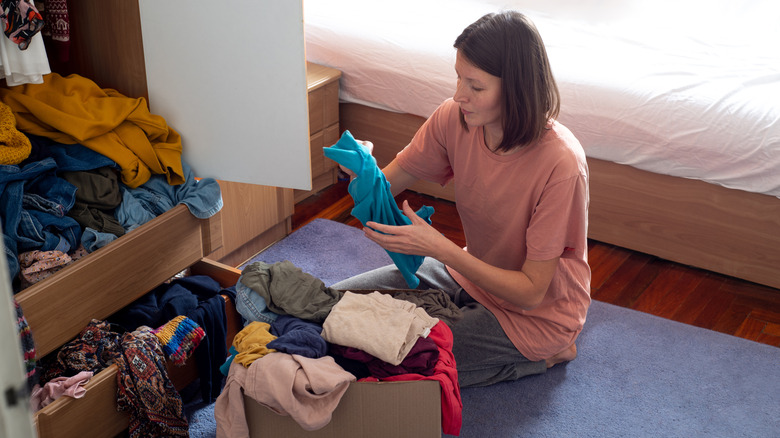What Is Clutter Blindness & How Do You Know If You Have It?
Humans are incredibly skilled at adapting to new situations, and in a culture that prioritizes consumption and accumulating more stuff, it's no surprise that many people have grown accustomed to living in environments totally overrun by clutter. According to a study by cleaning service Cleango, 54% of U.S. residents report feeling overwhelmed by the accumulation of clutter in their living space. Over time, clutter can fade into the background and become so familiar that you're "blind" to how it's affecting both your space and your wellbeing. There is even a name for this phenomenon — clutter blindness. Much like the familiar Febreze commercial that pokes fun at people who have gone "nose blind" to the pervasive odor of sweaty gym socks, those who have gone clutter blind can no longer see the chaotic state of their countertops and cabinets.
Clutter is becoming somewhat fashionable these days, thanks to the rise in the cluttercore design trend, which invites people to celebrate their colossal collections of knick-knacks. On the other hand, clutter is among the hidden ways that your home may be stressing you out, especially if there is nothing cute or intentional about your mess. A study by the University of California, Los Angeles found that clutter is linked to higher levels of the stress hormone cortisol, particularly among mothers. It also reduces our ability to focus and complete important tasks on time, while also affecting our relationships and mental health. The good news is that clutter blindness is curable and preventable by taking an evidence-based approach to forming new healthy habits.
Signs of clutter blindness
Clutter blindness has a way of sneaking up on you over time, especially if you live in a busy household or lead a full life. Sometimes, clutter reflects more than just a messy space; it can be a sign of an overly demanding schedule or emotional overwhelm, where organizing and cleaning becomes a low priority. There are a few tell-tale signs that you may have fallen victim to clutter blindness. First, and perhaps most obvious, is that you struggle to find a proper place for your things. You may find yourself sacrificing any available surface, such as the kitchen table, to dump your belongings. For this reason, it often takes you a while to find things you need. Even drawers and cabinets are chaotic, with items either filled to the brim or jumbled in a heap.
After a while, the idea of tackling the clutter can feel overwhelming, leading you to quietly accept it as a permanent aspect of your daily life. Though it may be a normal part of your world, you may still find yourself scrambling to create order in preparation for guests, or feel too self-conscious to have anyone over. For example, you might be among the 12% of Americans who become embarrassed when guests come to visit, according to the Cleango study. If you live with other people, your clutter blindness may also be creating tension in the household. The effects of clutter could also chip away at your sense of calm, causing you to feel unexplainably on edge, unsettled, or overwhelmed while you're at home.
How to cure clutter blindness
It's safe to say that you're far from the only victim of clutter blindness out there. Thankfully, it's not an incurable ailment — you can start taking small steps right now to create big positive shifts much sooner than you think. Depending on how blind you are to the clutter, you may need some help seeing it with fresh eyes. It may be helpful to take a picture of your space, as photos help us observe and remember things more clearly. Alternatively, asking a trusted friend or family member for kind yet constructive feedback can help you see where you can begin to make improvements. The rest comes down to adopting the same simple habits used by people who keep their homes clean and organized in an effective, sustainable way.
The best method to break old habits and replace them with better ones is to start with a manageable task that you can repeat daily. Begin by choosing one that is relatively easy — for example, set a timer for five minutes and choose a small area to tidy, such as your desk or nightstand. Use the time to declutter and organize as much of the area as you can, and then carry on with your day. Next, challenge yourself to return each item to its proper home instead of placing it down "just for now." Don't get discouraged by setbacks — research shows that occasional slip-ups do not ruin your chances of forming a new healthy habit.


